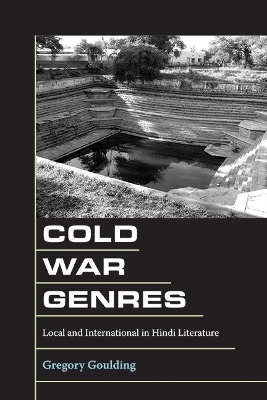
Cold War Genres
Local and International in Hindi Literature
Seiten
2024
State University of New York Press (Verlag)
978-1-4384-9959-8 (ISBN)
State University of New York Press (Verlag)
978-1-4384-9959-8 (ISBN)
Argues that the post-independence period was a unique era of literary experimentation in Hindi literature, which must be read in the contexts of both local and global cultural, social, and literary history.
Cold War Genres explores post-independence Hindi literature, framing it within the sociopolitical backdrop of Nehruvian India during the early Cold War. The book underscores the pivotal role of Hindi's claims to be a national language following independence, which fostered a unique moment of literary innovation. Central to its narrative is the work of Gajanan Madhav Muktibodh, a pivotal figure in modern South Asian literature. Using Muktibodh's poetry, criticism, and fiction as a primary example, the book shows how literary form shapes a response to the internal contradictions of 1950s India, one that must be read in light of both the antinomies of Hindi literature and North India as well as the aesthetic debates and emerging ideas of global space during this time. Cold War Genres therefore functions as a lens to evaluate questions of genre and form shared by a range of literary cultures in the mid-twentieth-century decolonizing world. This book features extensive translations from Muktibodh's poetry and prose, including full translations of two poems "Brahmarākṣas" (The Brahman Demon) and "Aṃdhere meṃ" (In the Dark).
Cold War Genres explores post-independence Hindi literature, framing it within the sociopolitical backdrop of Nehruvian India during the early Cold War. The book underscores the pivotal role of Hindi's claims to be a national language following independence, which fostered a unique moment of literary innovation. Central to its narrative is the work of Gajanan Madhav Muktibodh, a pivotal figure in modern South Asian literature. Using Muktibodh's poetry, criticism, and fiction as a primary example, the book shows how literary form shapes a response to the internal contradictions of 1950s India, one that must be read in light of both the antinomies of Hindi literature and North India as well as the aesthetic debates and emerging ideas of global space during this time. Cold War Genres therefore functions as a lens to evaluate questions of genre and form shared by a range of literary cultures in the mid-twentieth-century decolonizing world. This book features extensive translations from Muktibodh's poetry and prose, including full translations of two poems "Brahmarākṣas" (The Brahman Demon) and "Aṃdhere meṃ" (In the Dark).
Gregory Goulding is Assistant Professor in the Department of South Asia Studies at the University of Pennsylvania.
Acknowledgments
Note on Transliteration and Translation
Introduction
1. A Stream of Pure Sanskrit Curses: Caste, Knowledge, and Critique in the Long Poem
2. Realism, Romanticism, and the (Lower) Middle Class: The Problem of Aesthetic Process
3. Muktibodh's Prose Fiction and the Question of the Real
4. The Long Poem between Genre and Form
Conclusion: The Afterlives of Muktibodh
Appendix: Full Translations of "Brahmarākṣas" (The Brahmin Demon) and "Aṃdhere meṃ" (In the Dark)
Notes
Works Cited
Index
| Erscheinungsdatum | 03.09.2024 |
|---|---|
| Zusatzinfo | Total Illustrations: 1 |
| Verlagsort | Albany, NY |
| Sprache | englisch |
| Maße | 152 x 229 mm |
| Gewicht | 227 g |
| Themenwelt | Geisteswissenschaften ► Geschichte ► Regional- / Ländergeschichte |
| Geisteswissenschaften ► Sprach- / Literaturwissenschaft ► Anglistik / Amerikanistik | |
| Geisteswissenschaften ► Sprach- / Literaturwissenschaft ► Literaturwissenschaft | |
| ISBN-10 | 1-4384-9959-0 / 1438499590 |
| ISBN-13 | 978-1-4384-9959-8 / 9781438499598 |
| Zustand | Neuware |
| Haben Sie eine Frage zum Produkt? |
Mehr entdecken
aus dem Bereich
aus dem Bereich
Erinnerungen
Buch | Softcover (2024)
Pantheon (Verlag)
16,00 €
Universalgelehrter, Polarreisender, Entdecker
Buch | Hardcover (2024)
mareverlag
28,00 €


